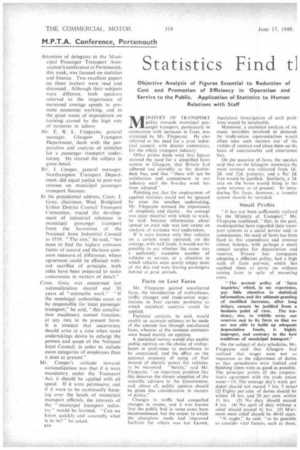M.P.T.A. Conference, Portsmouth
Page 20

If you've noticed an error in this article please click here to report it so we can fix it.
Attention of delegates to the Municipal Passenger Transport Assoc iation's conference at Portsmouth, this week, was focused on statistics and finance. Two excellent papers on these matters were read and discussed. Although their subjects
were different, both speakers referred to the importance of increased average speeds to promote economic working, and to the great waste of expenditure on training caused by the high rate of turnover in labour
Mr. E. R. L. Fitzpayne. general manager, Glasgow Transport Department, dealt with the preparation and analysis of statistics for a passenger transport undertaking. He treated the subject in great detail.
Mr. J. Cooper, general manager, Northampton Transport Department, "did equal justice to post-war stresses on municipal passenger transport finances.
In his presidential address, Coun. J. Gray, chairman. West Bridgford Urban District Council Transport Committee, traced the development of industrial relations in municipal passenger transport from the formation of the National Joint ,Industrial Council in 1919. " The aim," he said." has been to find the highest common factor of accord and the least common measure of difference; where agreement could be effected without sacrifice of principle, both sides have been prepared to make concessions in matters of detail."
Coon. Gray was concerned lest nationalization should end 30 years of "estimable work." " If the municippl authorities cease to be responsible for local passenger transport," he said, "this conciliation machinery cannot function, at any rate in its present form. It is ironical that uncertainty should arise at a time when some undertakings desire to enlarge the powers and scope of the National Joint Canna, in order to include more categories of employees than it does at present."
Mr. Cooper's attitude towards nationalization was that if it were mandatory under the Transport Act, it should be applied with all speed. If it were permissive, and if it were to be continually hanging over the heads of municipal transport officials, the interests of the " municipal transport industry " would be harmed. "Can we know quickly and assuredly what is to be? " he asked.
n14


























